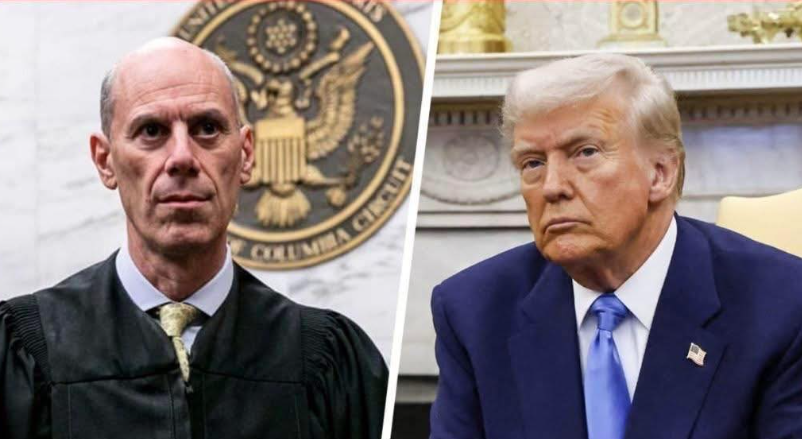Whispers are racing through Washington’s most tightly secured corridors, bouncing off marble walls and echoing through the hallways where deals, secrets, and influence intertwine. The subject of the murmurs is Judge James Boasberg, a figure who has long been regarded as a quiet but formidable presence on the federal bench, a jurist whose rulings often drew attention more for their precision than their spectacle. Yet now, for the first time in his tenure, he may face a reckoning of unprecedented visibility. Reports indicate that a shadowy operation, one that quietly swept up phone records and metadata from high‑profile conservative figures, has become the spark for a brewing political confrontation. Sources say that a relatively obscure Texas lawmaker, until now largely peripheral in national headlines, is actively preparing impeachment papers aimed squarely at Boasberg, a move that could upend decades of judicial norms and provoke a confrontation between branches of government rarely seen in modern Washington. Allies of the lawmaker caution, however, that this is only the opening salvo in what promises to be a protracted and bitter struggle—one that will extend beyond partisan lines and into the heart of institutional precedent.
The potential impeachment of a federal judge of Boasberg’s standing immediately ignites a debate over the limits of judicial authority and the safeguards designed to prevent abuse. Central to the controversy is the question of surveillance: specifically, the judge’s role in approving requests that enabled the collection of sensitive communications from public figures whose positions make them both politically and nationally significant. Critics argue that this kind of authority, exercised with little transparency, risks eroding public trust in the judiciary and normalizing what they see as partisan exploitation of legal instruments. To them, the notion that judges can silently authorize broad subpoenas or sweep up information from elected officials without accountability is dangerous. Impeachment, they assert, may be one of the few constitutional remedies available to ensure that judges remain bound by both law and principle, rather than their personal discretion or political calculation.
At the same time, defenders of Boasberg stress the delicate balance required of judges operating in high‑stakes, national security–adjacent contexts. They argue that disciplinary measures based on disputed rulings could fundamentally politicize the judiciary, turning courts into arenas of partisan contention rather than impartial arbiters of the law. In situations involving intelligence operations, classified investigations, or the protection of whistleblowers, judges are often compelled to authorize measures that would be unthinkable in ordinary circumstances. These measures, they contend, are not signs of malfeasance but of a judicial system functioning under extraordinary pressures, where the preservation of sensitive methods and sources sometimes necessitates temporary opacity. Removing or punishing a judge for such decisions could have a chilling effect, discouraging judges from approving necessary actions to protect national security, criminal investigations, or even civil liberties in the long term.
As the House of Representatives begins weighing evidence and precedent, the implications of this case reach far beyond the immediate actors. Legal scholars, former clerks, and political analysts are poring over every known detail of Boasberg’s past rulings, the language of the subpoenas, and the scope of any alleged overreach. At stake is not merely the fate of a single judge, but the broader question of how the American system balances the judiciary’s independence against the public’s right to know when power is exercised. Discussions are emerging across think tanks, law schools, and congressional hearings about how to ensure accountability without undermining the integrity of the federal bench. The debate has prompted renewed examination of secret subpoenas, surveillance authorities, and the delicate interplay between security and civil liberties, highlighting a tension that has long simmered beneath the surface but rarely erupted in such a public and consequential way.
Meanwhile, the political calculations are as intricate as the legal ones. Lawmakers on both sides of the aisle are navigating the optics of supporting or opposing impeachment, aware that their decisions could be interpreted as signaling either a commitment to oversight or a willingness to weaponize constitutional mechanisms for partisan advantage. Lobbyists, advocacy groups, and media outlets are all weighing in, some framing the effort as a necessary check on overreach, others as an unprecedented and dangerous politicization of the judiciary. Within Boasberg’s chambers, clerks and colleagues are reportedly monitoring the situation with a mixture of concern and professional detachment, knowing that a precedent set here could affect every judge called upon to rule in politically sensitive contexts in the future.
Ultimately, the controversy surrounding Judge Boasberg is about more than one individual, one lawmaker, or one set of records. It touches the very heart of American governance: the question of how far a branch of government can or should go when secrecy is required, and where the line between lawful authority and potential abuse must be drawn. As the story continues to unfold, the nation is reminded of the fragility of trust in institutions, the responsibility borne by those granted extraordinary power, and the persistent challenge of safeguarding both security and liberty in a complex and polarized society. Whether impeachment proceedings move forward or stall, and whether Boasberg retains his seat or faces disciplinary consequences, the debate will leave an indelible mark on public discourse about accountability, transparency, and the delicate equilibrium that defines the U.S. constitutional system.
